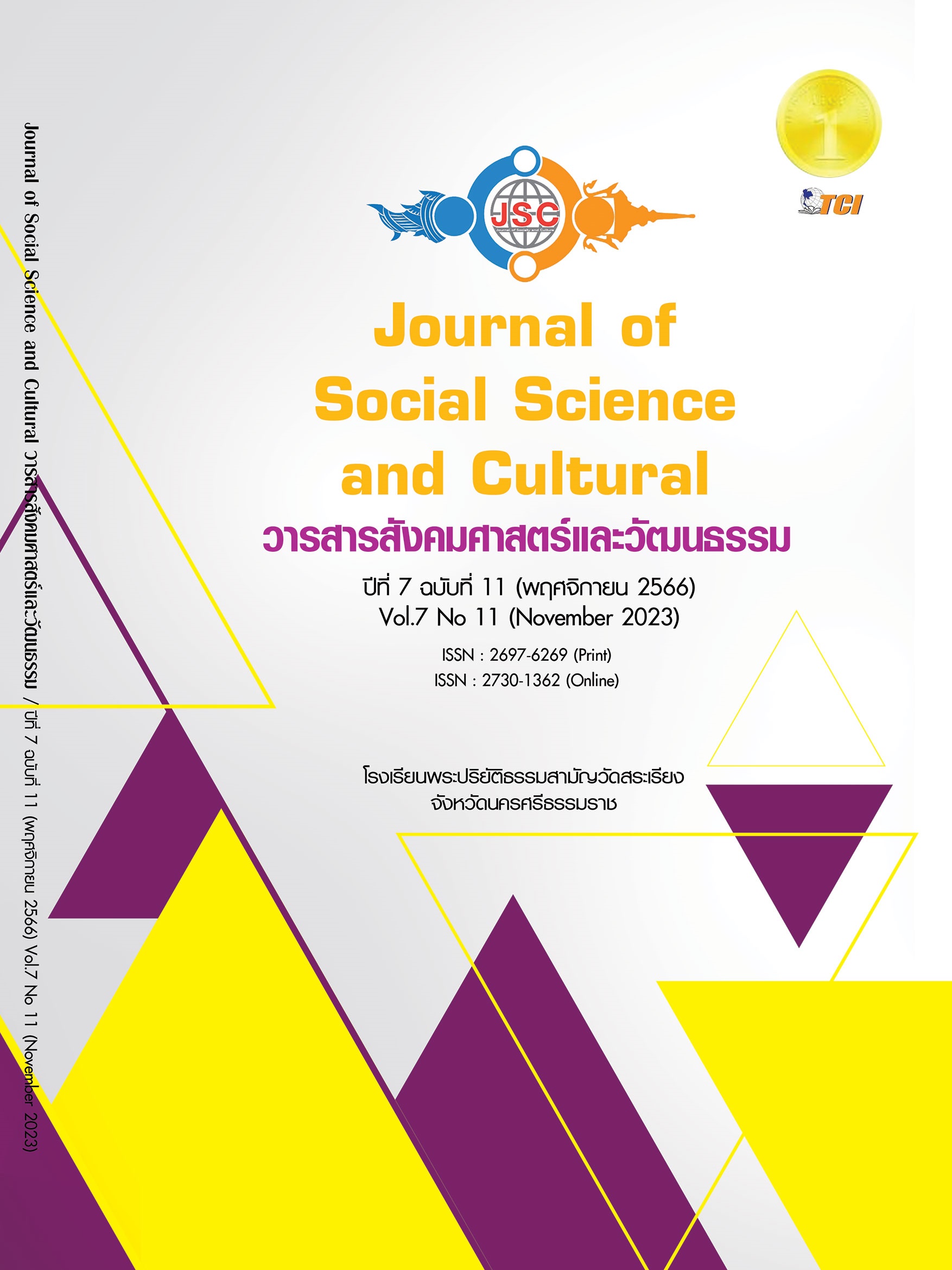DEVELOPMENT OF A PHYSICAL HEALTH PROMOTIONAL PROGRAM FOR OVERWEIGHT PRESCHOOL CHILDREN
Main Article Content
Abstract
The objectives of this research are 1) to analyze the causes of overweight and trends in overweight in early childhood. 2) develop a physical health promotion program for early childhood children who are overweight. 3) evaluate the use of the health promotion program. Physically for early childhood children who are overweight Using quantitative research methods The sample group was 50 preschool children aged 5 - 6 years, divided into an experimental group of 25 people and a control group of 25 people, using the weight according to height criteria, with a value greater than +2S.D or more, as the selection criterion. Randomly brought to classrooms by drawing lots. Tools used in the research: 1) A program to promote physical health for early childhood children who are overweight. 2) A manual for using a program to promote physical health for early childhood children who are overweight. Analyze data using the average standard deviation. The results of the research found that: 1) Analyze the causes of overweight in early childhood. Because children do not have time to exercise. 2) A program to promote physical health for early childhood children who are overweight has been developed, consisting of 5 days of exercise. Day 1: Basic physical exercise positions. Day 2: Physical exercise postures with equipment. Day 3: Dance to the rhythm of the Sun Smiling Song. Day 4: Let's dance to the rhythm of the song. And Day 5: Dance to the rhythm of the song. Exercise in the sunlight. 3) Evaluation results: average body weight After joining the program Experimental group that participated in the program decreased compared to the average before the experiment. Statistically significant at the .05 level, before the experiment the average body weight was 28.78 kilograms and after the experiment the average body weight was 26.28 kilograms.
Article Details
References
กรมอนามัย กระทรวงสาธารณสุข. (2564). กรมอนามัยเผยเด็กไทยอ้วนเปิดอาหารชูสุขภาพเสริมออกกำลังกายป้องกัน. เรียกใช้เมื่อ 1 ธันวาคม 2565 จาก https://multimedia.anamai.moph.go.th/news/news 0633-2/
กรมอนามัยสำนักโภชนาการ. (2565). สำนักโภชนาการกรมอนามัยรายงานประจำ ปี2565 เฝ้าระวังทางโภชนาการ. เรียกใช้เมื่อ 9 พฤศจิกายน 2565 จาก https://nutrition2.anamai.moph.go.th/th
กระทรวงศึกษาธิการ. (2560). หลักสูตรการศึกษาปฐมวัย พุทธศักราช 2560. กรุงเทพมหานคร: โรงพิมพ์ชุมชนสหกรณ์การเกษตรแห่งประเทศไทย.
นิรุตติ์ สุขดี และคณะ. (2562). การพัฒนาโปรแกรมการออกกำลังกายโดยใช้ทฤษฎีบูรณาการประสาทความรู้สึกร่วมกับ ภูมิปัญญาไทยเพื่อพัฒนาสมรรถภาพทางกายที่สัมพันธ์กับสุขภาพและ ทักษะทางสังคมของเด็กออทิสติก. วารสารครุศาสตร์จุฬาลงกรณ์มหาวิทยาลัย, 47(2), 150-168.
ศณิษา ตันประเสริฐ และ ธัญชนก คําแสน. (2561). ประสิทธิผลของโปรแกรมการควบคุมภาวะน้ำหนักเกินและอ้วนของเด็ก. วารสารสาธารณสุขศาสตร์, 48(3), 344-355.
ศูนย์พัฒนาองค์ความรู้ด้านกิจกรรมทางกายประเทศไทย (ทีแพค) สถาบันวิจัยประชากรและสังคม มหาวิทยาลัยมหิดลร่วมกับ สำนักงานกองทุนสนับสนุนการสร้างเสริมสุขภาพ (สสส.). (2563). แนวทางการดำเนินงาน โรงเรียนส่งเสริมกิจกรรมทางกายในประเทศไทย. (พิมพ์ครั้งที่ 1). นนทบุรี: บริษัท ภาพพิมพ์ จำกัด.
สาริษฐา สมทรัพย์. (2561). ความรอบรู้ทางสุขภาพในการจัดการภาวะน้ำหนักเกินและภาวะอ้วนในเด็กวัยเรียน. วารสารส่งเสริมสุขภาพและอนามัยสิ่งแวดล้อม, 29 (12), 20-33.
สำนักงานคณะกรรมการพัฒนาการเศรษฐกิจและสังคมแห่งชาติ. (2562). ยุทธศาสตร์ชาติระยะ 20 ปี(พ.ศ. 2561-2580).(พิมพ์ครั้งที่ 2). กรุงเทพมหานคร: สำนักงานเลขานุการของคณะกรรมการยุทธศาสตร์ชาติ สำนักงานคณะกรรมการพัฒนาการเศรษฐกิจและสังคมแห่งชาติ.
สำนักงานคณะกรรมการพัฒนาเศรษฐกิจและสังคมแห่งชาติ. (2559). สรุปสาระสำคัญแผนพัฒนาเศรษฐกิจและสังคมแห่งชาติ ฉบับที่สิบสอง พ.ศ. 2560-2564. กรุงเทพมหานคร: สำนักงานคณะกรรมการพัฒนาเศรษฐกิจและสังคมแห่งชาติสำนักนายกรัฐมนตรี.
Senol, F. B. (2021). Physical Activity and Preschool Children: Preschool Teachers' Perceptions. Southeast Asia Early Childhood, 10(2), 132-146.
Willumsen, J., & Bull, F. (2020). Development of WHO guidelines on physical activity, sedentary behavior, and sleep for children less than 5 years of age. Journal of physical activity and health, 17(1), 96-100.
WorldHealthOrganiztion. (2000). Obesity: Preventing and managing the global epidemic: Report of a WHO consultation. Retrieved March 17, 2023, from http:// www.books.google.co.th /booksida


